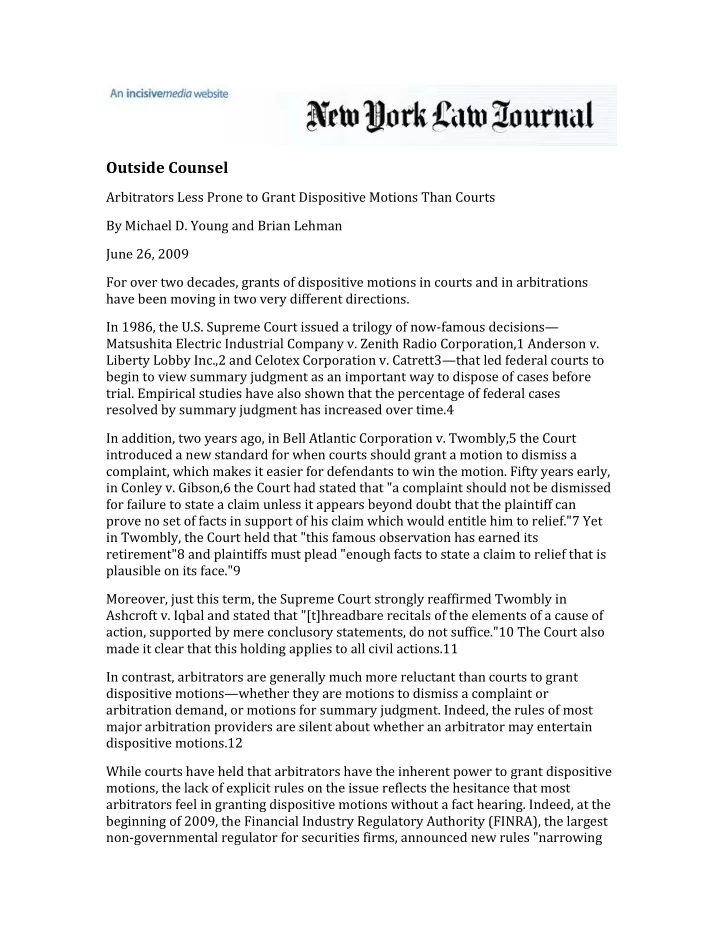

Outside Counsel Arbitrators Less Prone to Grant Dispositive Motions Than Courts By Michael D. Young and Brian Lehman June 26, 2009 For over two decades, grants of dispositive motions in courts and in arbitrations have been moving in two very different directions. In 1986, the U.S. Supreme Court issued a trilogy of now‐famous decisions— Matsushita Electric Industrial Company v. Zenith Radio Corporation,1 Anderson v. Liberty Lobby Inc.,2 and Celotex Corporation v. Catrett3—that led federal courts to begin to view summary judgment as an important way to dispose of cases before trial. Empirical studies have also shown that the percentage of federal cases resolved by summary judgment has increased over time.4 In addition, two years ago, in Bell Atlantic Corporation v. Twombly,5 the Court introduced a new standard for when courts should grant a motion to dismiss a complaint, which makes it easier for defendants to win the motion. Fifty years early, in Conley v. Gibson,6 the Court had stated that "a complaint should not be dismissed for failure to state a claim unless it appears beyond doubt that the plaintiff can prove no set of facts in support of his claim which would entitle him to relief."7 Yet in Twombly, the Court held that "this famous observation has earned its retirement"8 and plaintiffs must plead "enough facts to state a claim to relief that is plausible on its face."9 Moreover, just this term, the Supreme Court strongly reaffirmed Twombly in Ashcroft v. Iqbal and stated that "[t]hreadbare recitals of the elements of a cause of action, supported by mere conclusory statements, do not suffice."10 The Court also made it clear that this holding applies to all civil actions.11 In contrast, arbitrators are generally much more reluctant than courts to grant dispositive motions—whether they are motions to dismiss a complaint or arbitration demand, or motions for summary judgment. Indeed, the rules of most major arbitration providers are silent about whether an arbitrator may entertain dispositive motions.12 While courts have held that arbitrators have the inherent power to grant dispositive motions, the lack of explicit rules on the issue reflects the hesitance that most arbitrators feel in granting dispositive motions without a fact hearing. Indeed, at the beginning of 2009, the Financial Industry Regulatory Authority (FINRA), the largest non‐governmental regulator for securities firms, announced new rules "narrowing
significantly" the grounds for granting motions to dismiss in its arbitrations.13 These rules do not distinguish between "motions to dismiss complaints" and "summary judgment motions," but apply to any pre‐hearing motion to dispose of the case. Under the new rules, a FINRA arbitration panel can only grant a motion to dismiss for one or more of these three reasons: (1) the parties have a written settlement; (2) the complaint involves a "factual impossibility"—for example, the claimant sued the wrong company or person; or (3) the six‐year eligibility rule for claims has expired.14 The new rule also requires that the arbitrators conduct an in‐person or telephonic prehearing conference on the motion, and that a decision to grant the dispositive motion be unanimous. The panel also is required to issue a written explanation of a decision to grant dismissal. Finally, a losing movant is responsible for the forum fees for the review of the motion, and if the panel finds that a motion under this rule was frivolous, it must award reasonable costs and attorney's fees to any party that opposed the motion. While the FINRA rule has struck some attorneys who are not familiar with arbitrations as severe, those with experience litigating claims at FINRA—and, more generally, in arbitration—have recognized that "the rule change may just institutionalize an already accepted practice."15 After the rule was finalized, FINRA Dispute Resolution President Linda Fienberg issued the following statement: "Although arbitrators rarely grant such motions, it is costly and time‐consuming for parties to defend motions to dismiss."16 According to the College of Commercial Arbitrators, a national professional association of individuals who primarily conduct arbitrations of business‐related disputes, "Commercial arbitration generally reflects a strong proclivity to avoid court‐like motion practice to refine pleadings or to dismiss a matter for failure to state a claim properly."17 Moreover, the odds that an arbitrator will grant a summary judgment motion are only slightly higher than the odds he or she will grant a motion to dismiss. Why are dispositive motions being treated so differently by arbitrators, as compared to judges? There are at least three institutional reasons, which also highlight some of the advantages of arbitration. Review of Decisions First, while every litigant is entitled to appeal the grant of a dispositive motion in federal or state court, a final decision in arbitration is subject to far less review. Moreover, appellate court review of such a grant is de novo, with the allegations or evidence, as the case may be, read in the light most favorable to the plaintiff. In addition, to the extent that the trial court has interpreted the law, the reviewing court is free to interpret and apply the law differently.
Recommend
More recommend